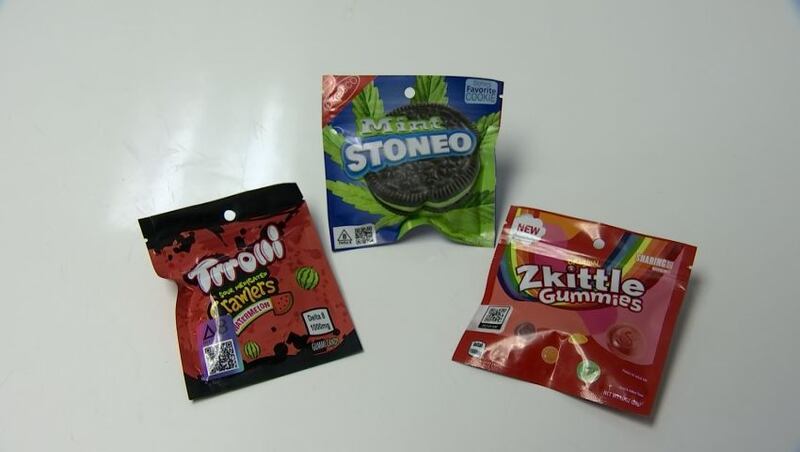State officials are warning people about gummies and other products with an ingredient called delta-8 THC that are popping up online and in local convenience stores and smoke shops.
The products are made from hemp, not cannabis, but they can get people high. They promise they are ‘infused’ with cannabis but they are not allowed in any licensed cannabis stores, and some of them look very similar to popular candy like Skittles and Oreos.
KIRO 7 showed some of the items to parents in Seattle.
“It looks like something that would be passed out at Halloween, honestly,” parent Alanna Lochmann said.
“Have you heard of delta-8 before?” KIRO 7 reporter Linzi Sheldon asked her.
“No, I have never heard of delta-8,” Lochmann said.
“All of a sudden it was delta-8,” David Postman, chair of the Washington Liquor and Cannabis Board, said. “And I was like, wait, what’s that?”
Postman now knows the difference all too well.
Scroll down to continue reading
More news from KIRO 7
- Man arrested in connection with murder of 24-year-old Tacoma mother
- Watch out, gardeners: Invasive jumping worms reported in 34 states
- Nearly 6,000 without power around Puget Sound
- Do you have an investigative story tip? Send us an email at investigate@kiro7.com
Hemp is high in CBD and low in THC, the substance that gets a person high. Cannabis is low in CBD and high in THC. While cannabis is legal in Washington on the state level, hemp was legalized on the federal level in 2018. But that led to an oversupply of hemp in the market. So some entrepreneurs decided to take CBD from hemp to a lab and turn it into THC— delta-8 THC in this case, which is only found in very small amounts naturally.
“You’re taking this one thing and you’re going to a lab and you’re turning it into something else,” Postman said. “It’s kind of mysterious.”
Postman believes under current state law, these delta-8 products are not allowed in Washington, but an effort to pass a clear ban on them failed this year in the legislature.
Industry groups like the Washington Cannabusiness Association, which represents 86 cannabis producers, processors, retailers, and transporters, say they are concerned about delta-8′s availability to children.
“Our top priority is public safety,” WACA spokesperson Aaron Pickus said. “And no intoxicating products should be available on the unregulated marketplace and gas stations or online, where kids can access them and they can be delivered straight to your front door.”
But in addition to those delta-8 products, some entrepreneurs started making delta-9 THC from hemp as well. That is the THC already found in high amounts of cannabis naturally. And now a battle is brewing over it.
“We need to figure out what that process is for determining what we’re talking about here. You know, is this ‘Frankenweed’? Is it just the next step? Is it a natural evolution of the industry?” Postman said.
Right now, state-wide, products with delta-9 THC made from hemp are not allowed on any cannabis store shelves.
Micah Sherman wants it to stay that way. He grows cannabis for his company, Raven, and is a member of the Washington Sun & Craft Growers Association. They say delta-9 THC made in the lab just is not the same as what is what’s extracted from this cannabis, and that its presence in the regulated market would also drive down prices and hurt jobs.
“We have a regulated marketplace for synthetic drugs and it’s through the FDA process,” Sherman said. “So nobody’s saying that these things shouldn’t exist and that they should be prohibited. We’re saying that they should be in the same space as all other synthetic drugs.”
But Pickus calls delta-9, delta-8, and other synthetically-derived cannabinoids an “innovation” in the cannabis processing industry. He said the businesses he represents would be open to discussing labeling, which would tell customers where the THC is coming from.
“There’s already quite a bit of information on the label, harvest dates, stuff like that, you know, where the cannabis was grown, and things of that nature,” he said. “So there could be a broader conversation about labeling, absolutely. So the consumer can make that choice… really the question is: how do we make sure that what is available to adult users is safe and quality controlled and tested so that businesses can compete within a regulated marketplace to offer choices to adult users?”
As for the delta-8 products popping up, the Liquor and Cannabis Board is warning businesses it regulates, like smoke shops, not to sell them.
“Should parents be concerned their kids might get a hold of this?” KIRO 7 reporter Linzi Sheldon asked.
“Absolutely,” Postman said. “They need to know that... [it] doesn’t mean it’s okay, just because it’s in a store.”
The LCB is continuing to research the science behind all this and is considering its next steps on these kinds of products.
©2022 Cox Media Group








